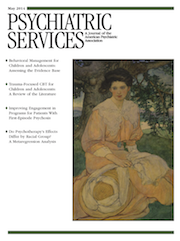Integrated Care: Nonfasting Screening for Cardiovascular Risk Among Individuals Taking Second-Generation Antipsychotics
Abstract
Ischemic heart disease (IHD) is the leading cause of mortality among adults with severe mental illness. Although gains in reducing mortality from IHD through screening, risk reduction, and early intervention have been realized for the general public, rates of recognition and treatment among individuals with mental illness continue to be poor. Obtaining blood samples from patients who have been fasting for eight to 12 hours is challenging for adults with severe mental illness and presents an additional obstacle to screening and treatment. This column outlines newer guidelines for cholesterol and diabetes screening that provide valid alternatives to fasting blood draws, thereby significantly reducing this common barrier to recognition of leading risk factors for IHD.




